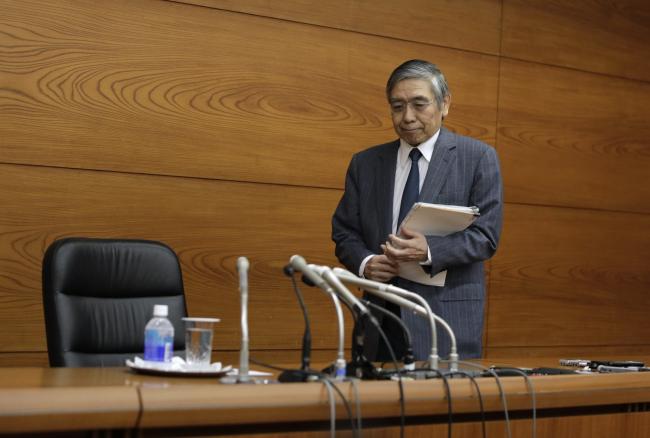(Bloomberg) -- Bank of Japan Governor Haruhiko Kuroda said the central bank can help avoid negative price shocks and achieve its 2 percent inflation target by working on inflation expectations through forward guidance.
“Although there remain issues to be resolved to achieve the price stability target of 2 percent, the environment surrounding prices in Japan has improved steadily compared to five years ago,” Kuroda said in a speech at the University of Zurich’s Swiss Institute of International Studies on Monday. “It is not easy to quickly dispel the deflationary mindset that has formed over the course of 15 years of deflation.”
The BOJ remains far from its 2 percent inflation target even after more than four-and-half years of massive monetary easing. Kuroda has repeatedly said that the central bank needs to continue with its stimulus, even as other central banks begin taking steps to tighten policy.
Kuroda said Monday that with a steadily improving output gap, companies are likely to gradually raise wages and prices.
“If further price rises come to be widespread, inflation expectations are likely to rise steadily. The Bank will continue to persist with powerful monetary easing to ensure that such positive developments are not cut short.”
With the Federal Reserve and the European Central Bank moving toward normalization, the BOJ is diverging further and further from its peers. This may keep the JPY/USD weak and contribute to inflationary pressures at home, while leaving it vulnerable to any economic shocks in coming years.
The yen has lost about a quarter of its value since Prime Minister Shinzo Abe took the helm in late 2012, helping boost corporate profits to a record level. The Nikkei 225 Stock Average rose to the highest level since 1992 last week amid a series of upward revisions in earnings reports by Japanese companies.
Investors are turning their attention to who will be leading the BOJ after Kuroda’s current term ends in April. With market expectations that Abe wants to avoid taking risks, Kuroda has extended his lead in a guessing game of who will be the next governor, according to a Bloomberg survey.
Abe has said the slate is blank when it comes to deciding on the top job at the BOJ, while also indicating he has faith in the governor. Finance Minister Taro Aso has also praised Kuroda.
Click here to see the full results of the BOJ governor survey
Kuroda adopted a yield-curve control program in September 2016 in which the BOJ aims to keeps a short term rate at -0.1 percent and 10-year bond yields around 0 percent.
Despite the shift to this more sustainable framework and some slowdown in asset purchases, the BOJ’s balance sheet continues to swell and is approaching the size of Japan’s 543 trillion yen ($4.8 trillion) economy.
The central bank continued to stick with its policy at a meeting ended on Oct. 31, even as it trimmed inflation forecasts. Japan’s core inflation, which excludes fresh food, rose 0.7 percent in September from a year earlier. The BOJ has taken a wait-and-see stance as it points to a tight labor market that it hopes will accelerate inflation.
Japan’s third-quarter gross domestic product data to be released on Wednesday will show an extension of the longest expansion since 2001, according to a Bloomberg survey.
Some lawmakers and economists have expressed concern that Japan’s monetary easing isn’t bringing the inflation goal within sight. Naoyuki Yoshino, dean of the Asian Development Bank Institute, joined with the calls for the BOJ to unwind stimulus because it’s not very effective for the aging society.
